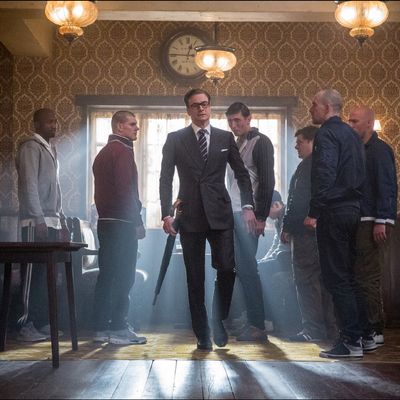
The kind of action extravaganza only a truly fallen civilization can produce, Kingsman: The Secret Service will both entertain you and send you running to the shower. Adapted (loosely) from Mark Millar and Dave Gibbons’s gleefully brutal 2012 comic book The Secret Service with in-your-face visual bravado by Matthew Vaughn (who also turned Millar’s Kick-Ass into a similarly deranged and beautiful killfest), this tale of a young tough getting introduced into a clandestine espionage network takes a familiar setup and upends it with comically stylized brutality.
The film knows its story is an obvious one. “Have you seen Trading Places, Nikita, Pretty Woman?” Colin Firth’s Harry Hart (code name: Galahad) asks our hero Eggsy (Taron Egerton), a council estate kid with a chip on his shoulder. Eggsy hasn’t heard of those films, but he has heard of My Fair Lady, one of Kingsman’s less intuitive reference points. Due to a long-ago incident that left Eggsy’s father dead, Harry has been waiting for the opportunity to try and turn the troubled young man into a Kingsman — a secret group of international super-spies formed out of a centuries-old order of tailors. The Kingsmen are run out of a Savile Row shop, and they pay as much attention to their bespoke suits and fine Scotch as they do to their elaborate gadgets and bulletproof umbrellas — they’re a fantasy of weaponized Englishness.
Most of Kingsman’s story involves Eggsy and several other young initiates’ attempts to make it through the order’s intense training program, at the end of which only one of them will be allowed to join. There is a ticking clock, however: Richmond Valentine (Samuel L. Jackson), a colorful internet-billionaire-cum-climate-change-doomsayer, is going around the world hatching an evil plot that involves kidnapping celebrities and politicians while giving everybody free SIM cards that may or may not have some mind-altering properties. We’re not sure what Valentine’s ultimate aim is, but he’s clearly up to no good: He can’t stand the sight of violence, so his dirty work is done by the young, lithe Gazelle (Algerian actress Sofia Boutella), who has deadly, razor-sharp blades instead of feet and who already killed one of the Kingsmen in the film’s opening scenes.
More than any other director, Vaughn (who also made the well-liked X-Men: First Class) has found a cinematic analogue for the intricacy of the comic-book page. Kingsman is full of elaborately orchestrated violence and acrobatic stunt work, shot in fast, sinewy, CGI-enhanced long takes that push and pull our perspective this way and that. It’s all very silly and not really meant to be taken seriously, but as the story gets more and more brutal, something strange happens: We start to care for these cartoonish characters and this absurd scenario. A similar thing happened in Kick-Ass: the film’s willingness to kill off key characters, to send the story spinning off in ever-darker directions, all the while not letting up on its cheekiness, made us think anything was possible — that a crazy person might be behind the camera. It has the curious effect of investing you in what happens onscreen, as if that might be the only way to maintain your sanity.
There’s a funny, somewhat intentional disconnect at the heart of Kingsman. The film’s central conceit is that to be a super-spy, you not only have to be a lethal killer, you also have to be a debonair gentleman (or gentlewoman), one with unflinching moral rectitude — a philosophy the film itself casually and knowingly betrays with the gonzo joy it takes in its many scenes of tongue-in-cheek violence. But would a gentleman cackle with laughter at the sight of a bad guy grimacing in disgust as his fellow henchman’s tooth flies past him in slow-motion? Or of a man getting stabbed in the face while watching his own severed hand fly past him? Or of a racist preacher getting a flagpole stuck through his mandible? No, Kingsman is not a film for gentlemen. It’s for us, the great unwashed, bloodthirsty audience. It’s an immaculately engineered, laugh-out-loud appeal to our own depravity.


